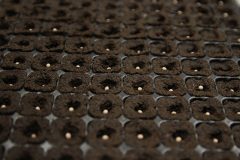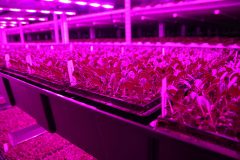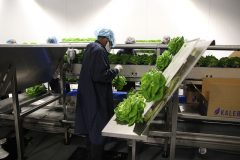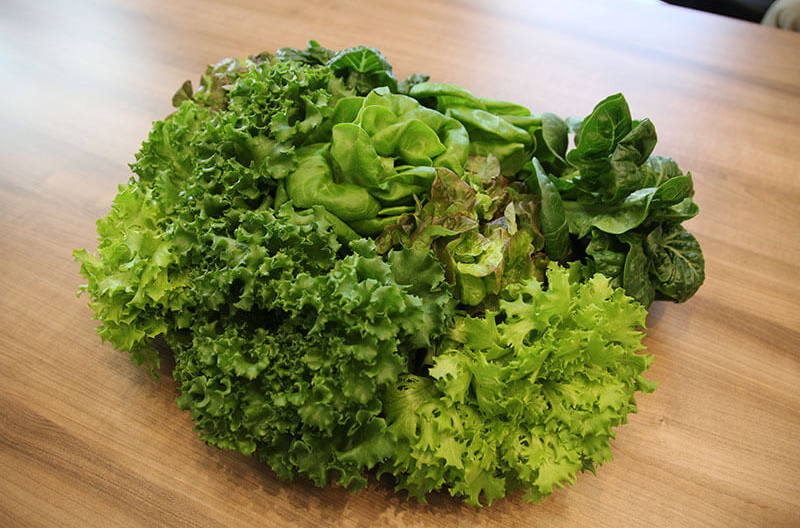by Eric Pereira / staff writer
The Shelby Report of the Southeast recently had the opportunity to tour indoor vertical farming company Kalera’s new facility in Forest Park, Georgia.
The 77,000 square-foot operation is Kalera’s largest to date — and the largest vertical lettuce farm in the southeastern U.S. It has the capability of producing more than 10 million heads of lettuce per year.
“What COVID is showing more than anything – people really care about where their food comes from, how clean, how fresh, how pure, how sustainable is the product,” said CEO Daniel Malechuk. “And those are things that we’re very excited about. So the demand for our product is going to only continue to increase.”
The Atlanta facility grows a variety of lettuce, including romaine, butter bibb, red oak leaf, frisée and Kalera Krunch. Malechuk noted it soon will venture into growing microgreens.

Kalera is working with key major foodservice distributors, however, its products can be found in other avenues as well.
Grocery customers include Publix and Winn-Dixie, as well as companies such as Royal, Sysco and FreshPoint. Atlanta area locations that feature Kalera products include the Georgia World Congress Center, Ansley Country Club, Atlanta Hawks’ and Falcons’ facilities and Emory Hospital. Kalera also is working with various school systems throughout the state.
“We will be growing and increasing the production to 100 percent over the next several months moving forward, rather than coming all on at once inundating the market,” Malechuk said.
Kalera currently operates three growing facilities – Forest Park and two in Orlando – and is building facilities in Houston, Denver, Seattle, Minnesota, Hawaii and Columbus, Ohio. The Houston location, which will be the next to open, will top the Georgia facility in size.
“We have many new facilities, each one we’re going to tweak and continually make better as we learn,” Malechuk said.
Turning to Kalera’s products, one of the first attributes the CEO points to is reduction in the carbon footprint.
“For you to get product (lettuce) from Salinas Valley, California, is 2,447 miles, that’s 35 hours nonstop on a truck,” he said.
“By the time you actually eat a product around here that’s come from California, it’s generally anywhere from 12 to 17 days old,” he said. “So local saves obviously in carbon footprint, and you get the product a lot fresher. And when a product is delivered within hours, you avoid decomposition. It stays fresher, longer.”
 Malechuk added that the Atlanta facility, via a closed loop system, uses about 3 percent of the water of traditional farming.
Malechuk added that the Atlanta facility, via a closed loop system, uses about 3 percent of the water of traditional farming.
“The water just goes exactly to right where the plant needs, the roots of the plants, and they drink it,” he said. “And whatever isn’t used is in a closed loop system over and over again.”
Kalera has also acquired Vindara, which is the first company to develop and deliver proprietary seeds specifically designed for use in indoor vertical farming. This eliminates the limitations of traditional seeds and provides a greater yield. In other words, bigger plants that grow faster.
“Kalera is the only company that has the ability with our acquisition of Vindara to partner with a retail customer, for example, or food service operator, then grow them a plant tailored specifically to their needs that they can own,” Malechuk said.
“We can do that in quick turnaround time. And that’s really through co-development of a proprietary varietal that we can offer our customers and even trademark it or name it after them for their company, and they’ll be the only one. 
“The size, the color, the texture, the flavor, the crunch, the crispiness – all of those things we can quickly modify for them and grow that plant non-genetically modified specifically for them.”
In terms of the pricing of the product, those looking to work with Kalera don’t have to worry about the volatility of the product price, according to Malechuk.
“We lock it, and you can forget about it, which has never been done in the history of produce,” he said.

